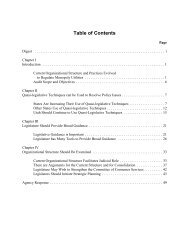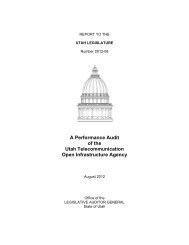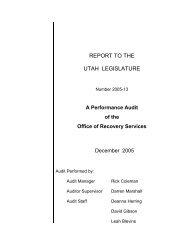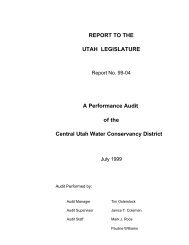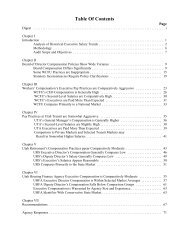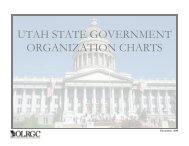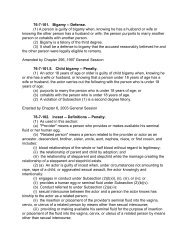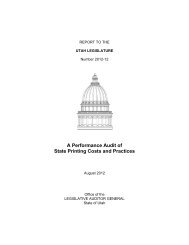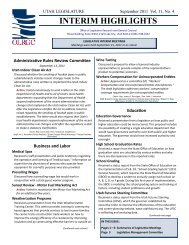A Review of the Judicial Conduct Commission - Utah State Legislature
A Review of the Judicial Conduct Commission - Utah State Legislature
A Review of the Judicial Conduct Commission - Utah State Legislature
Create successful ePaper yourself
Turn your PDF publications into a flip-book with our unique Google optimized e-Paper software.
formal charges to also decide whe<strong>the</strong>r <strong>the</strong> charges were proven.According to <strong>the</strong> American Judicature Society, that argument has beenrejected by every state Supreme Court that has considered it becausecommission decisions are reviewed by <strong>the</strong> Supreme Court.Although a separation <strong>of</strong> <strong>the</strong> prosecutorial and adjudicative roles is notrequired by constitutions, some states have adopted it as a matter <strong>of</strong> policyusing a two-panel, or a two-tier, system. Two-panel systems are where<strong>the</strong> investigative and adjudicative roles are handled by different panels <strong>of</strong><strong>the</strong> commission, each with <strong>the</strong>ir own counsel. The use <strong>of</strong> two panels isbased on <strong>the</strong> American Bar Association Model Rules, although no statehas adopted <strong>the</strong> precise structure suggested by <strong>the</strong> Model Rules.A step beyond <strong>the</strong> two-panel system is <strong>the</strong> two-tier system. In eightstates, complaints against judges are investigated by one body (<strong>of</strong>tenreferred to as <strong>the</strong> first tier) which decides whe<strong>the</strong>r to file formal charges;<strong>the</strong> formal charges are <strong>the</strong>n heard and decided by a second body that has adifferent name and a different membership (second tier).The two-panel ortwo-tier systemsappear more fair butmay be more costlyand time consuming.The main drawback to separating <strong>the</strong> prosecutorial and adjudicativeroles is cost. <strong>Utah</strong> currently has a commission made up <strong>of</strong> 11commissioners representing judges, attorneys, <strong>the</strong> legislature and <strong>the</strong>public. The commission has a support staff including an executivedirector, part time investigator and part time <strong>of</strong>fice staff that costs <strong>the</strong>state about $230,000 per year. Currently, representation is from around<strong>the</strong> state. To create a two-panel or a two-tier system could substantiallyincrease <strong>the</strong> cost <strong>of</strong> <strong>the</strong> commission and <strong>the</strong> time necessary to review eachcase.<strong>Utah</strong> Deviates from O<strong>the</strong>r <strong>State</strong>s’Practices in Some Areas<strong>Utah</strong> maintains moreconfidentiality thano<strong>the</strong>r states.<strong>Utah</strong>’s <strong>Judicial</strong> <strong>Conduct</strong> <strong>Commission</strong> differs from <strong>the</strong> majority <strong>of</strong>states in two areas: degree <strong>of</strong> confidentiality and level <strong>of</strong> legislativeparticipation. <strong>Utah</strong>’s JCC maintains <strong>the</strong> confidentiality <strong>of</strong> most recordsand proceedings <strong>of</strong> alleged misconduct against <strong>Utah</strong> judges.Confidentiality ceases only when cases go to <strong>the</strong> <strong>Utah</strong> Supreme Court forpublic discipline. Most o<strong>the</strong>r states do not maintain <strong>the</strong> same level <strong>of</strong>confidentiality <strong>of</strong> <strong>the</strong>ir proceedings as does <strong>Utah</strong>.Office <strong>of</strong> <strong>the</strong> <strong>Utah</strong> Legislative Auditor General – 17 –




